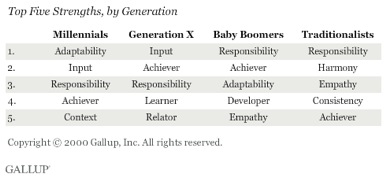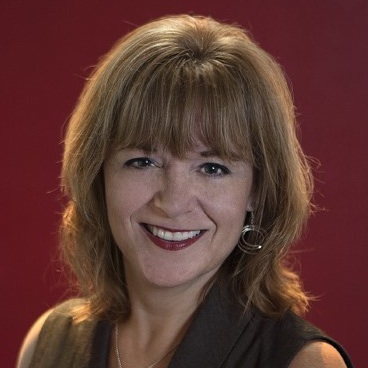When a parent wanted you to eat your vegetables, were you told something like, “Don’t you want to grow up big and strong?” Mine certainly did. We put a lot of emphasis on being strong -- and for good reason. Being strong is as old as the biblical Samson. Being strong indicates we are healthy. Being strong means we have a shot at being Superman, Superwoman or simply super. Being strong while communicating says we get our point across.
Donald O. Clifton, a pioneer researcher who spent four decades studying strengths, and the honored father of Strengths-Based psychology, created the Clifton StrengthsFinder as leader of a group of Gallup scientists. Tom Rath documents the next generation of the concept and accompanying assessment in his blockbuster book, StrengthsFinder 2.0. As a huge advocate of working from strengths, one of my favorite parts (and there are quite a few!) is the notion that talent x investment = strengths.
Ah, so becoming strong and using our strengths well requires effort. We need to make an investment. Yes, we are born with innate abilities. And they need to be honed and seasoned if we want to keep them up there in the strengths department. If we intentionally exercise our muscles, don’t we get better? Our communication strengths are like that too. They need to be exercised.
Hmm, does that mean you should practice your listening skills 15 minutes a day with progressive reps until failure? Watch your nonverbal behavior in a mirror mounted at your desk during random conversations? Grunt when you have to concentrate really hard to get what someone is trying to tell you? Though those are fun visuals to imagine, we’re on a different wavelength here.
Three things we can we do to grow up (communicatively speaking) & make the most of our strengths:
1. Learn what your strengths are.
Take assessments like StrengthsFinder 2.0 to help you understand them and what you can do to amplify them. The book, referenced above, offers you what each of strengths sound like when they are communicated, ideas for action and how to work with others that have the same strengths as you do.
Mine are Achiever, Strategic, Learner, Input and Individualization. As a Baby Boomer, my number one, Achiever, is among the top five strengths of my generation. It is interesting to compare -- and to realize each generation in the US also has Achiever as one of the top 5 strengths. See, we do have something in common!

2. Like concentrating on a certain muscle group, you can choose to concentrate on building up a strength that you can use even more to connect with your co-workers.
Which one resonates the most? How can you use your communication skills to hone it even more? Do people know why you do the things that you do? Might they benefit from understanding? A powerful exercise is to review your strengths and write a sentence or sentiment that you feel captures each one. Start with “I am…” statements. Explain them individually or create a paragraph with those five or six sentences. Voila! Here is who you are. Find ways to share these with your team and use them daily.
3. Insure you communicate your strengths to your boss for your own good.
It’s time to grow up and have these conversations. Supervisors are not mind readers! Want to do this but not sure how to initiate? I believe there are many that simply don’t know how to begin the conversation. Try these starters on for size:
-
“I think I can be even more successful by working from my strengths. I was curious on what those are so I took this assessment….”
-
“I have been reflecting on how I can use my strengths. I am Adaptable. That means (fill in the blank here). I see we need this skill on this project ____ . How can we get me involved?”
-
“I know the organization is committed to my development. I’ve been thinking about what strength I’d like to focus on developing….”
-
“What strengths are required for my next career goal, (insert here)? I’d like to focus energy on developing my strengths and would appreciate your support. I’m (insert your strengths here). This is what that means to me (Insert sentences from #2 above). Do you have ideas on how I can get even better at this?”
Why work from an area of weakness that depletes you? Work from your strengths. Know them. Amplify them with your team and supervisor. Use them for your own development. While you may not be able to be a body builder, big and strong, you can be big and strong in another way. Concentrate on your strengths to become an excellent, enthusiastic and energized employee. The world needs you, Atlas.
 Written by Sherri Petro, President of VPI Strategies & California Miramar University (CMU) Professor Sherri is a professor, accomplished strategist, organizational development professional and executive coach. She consulted for 13 years in the for-profit, non-profit, and government sectors after a 16 year corporate career. She teaches the Strategy Capstone as well as Leadership, Change Management and Business Ethics courses in CMU’s MBA program. Her current passion is educating organizations on how to increase organizational sustainability by leveraging the talents and skills of all in multi-generational workplaces. Sherri offers remedies to misunderstandings that result from different belief structures and lack of coherent communication by creating understanding and making connections at the belief level not only at the behavioral level.
Written by Sherri Petro, President of VPI Strategies & California Miramar University (CMU) Professor Sherri is a professor, accomplished strategist, organizational development professional and executive coach. She consulted for 13 years in the for-profit, non-profit, and government sectors after a 16 year corporate career. She teaches the Strategy Capstone as well as Leadership, Change Management and Business Ethics courses in CMU’s MBA program. Her current passion is educating organizations on how to increase organizational sustainability by leveraging the talents and skills of all in multi-generational workplaces. Sherri offers remedies to misunderstandings that result from different belief structures and lack of coherent communication by creating understanding and making connections at the belief level not only at the behavioral level.
Do you have a question for Sherri? Please visit our Workplace Communication Skills Community, she will be happy to help: Ask an Expert
About ManagingAmericans.com
We are America’s Management & Leadership Center for Professional Development. Our well-rounded business content is designed for Leaders & Managers to implement change with ease & improve accountability amongst their teams. Here you’ll find Articles from 30+ Expert Consultants, Coaches & Thought Leaders, access practical Business Templates, learn new skills & connect to our Expert Panel to answer your organizational challenges.